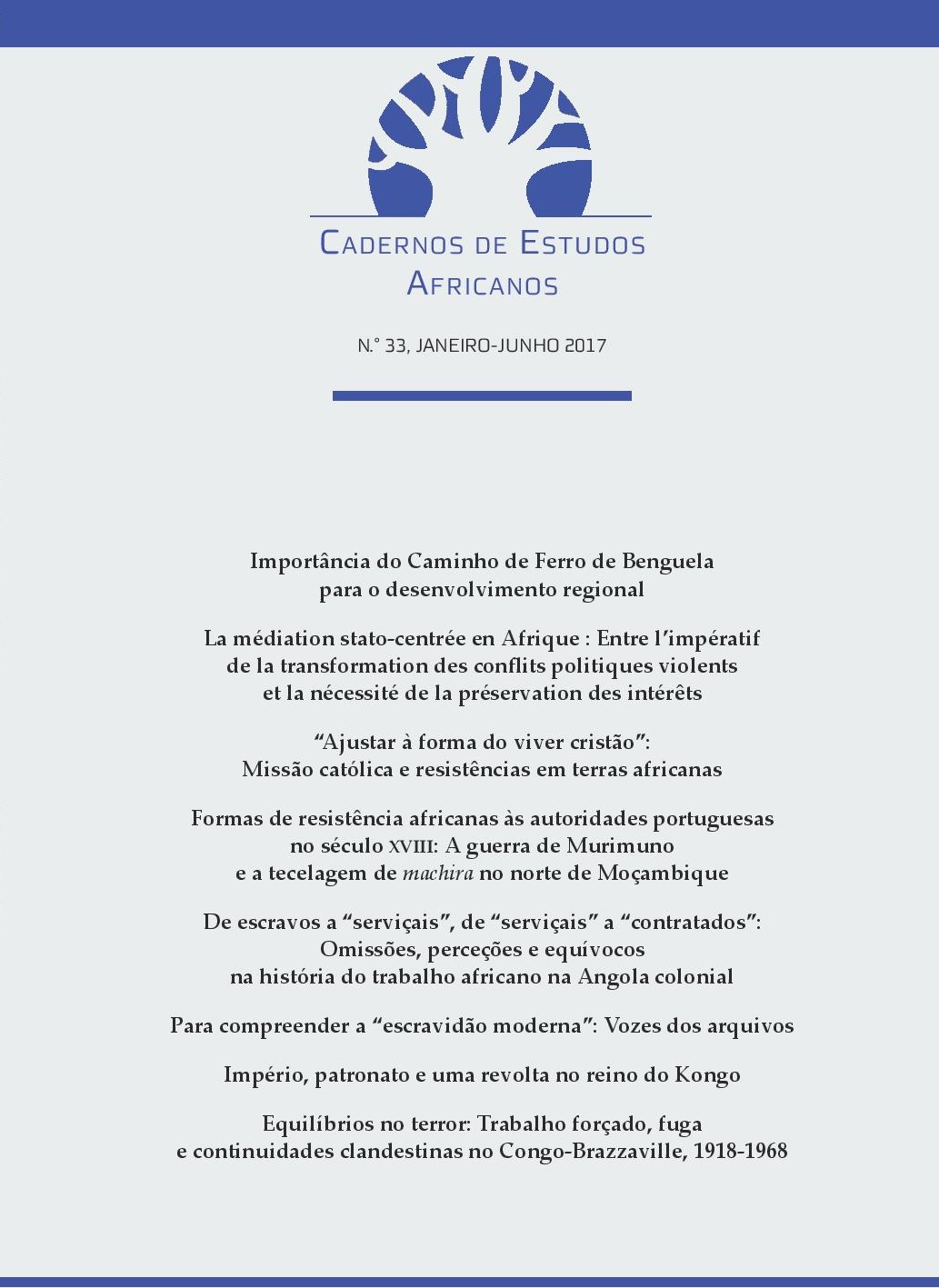Império, Patronato e uma Revolta no Reino do Kongo
DOI:
https://doi.org/10.4000/cea.2225Palavras-chave:
Angola, Kongo, resistência, dominação colonial, clientelismo, cultura políticaResumo
Este artigo argumenta que o famoso levante ocorrido no Kongo, em 1913, simbolizou uma rotura nas relações clientelistas estabelecidas entre o Estado colonial português, os governantes do Kongo em São Salvador, e seus eleitores locais. Por um lado, a imposição colonial do trabalho forçado minou um contrato social que fazia o rei do Kongo confiável para os chefes subalternos e seus seguidores. A revolta subsequente contra o governante em exercício, Manuel Kiditu, é explicada em termos de economia moral como uma resposta coletiva ao desrespeito às regras da reciprocidade social por parte de Kiditu e seus assessores. Por outro lado, a quebra nas relações de confiança entre Kiditu e o líder rebelde Álvaro Buta também desempenhou um papel crucial na revolta.Referências
Barnes, S. T. (1986). Patrons and power. Creating a political community in metropolitan Lagos. Bloomington: Indiana University Press.
Bayart, J.-F. (1993). The state in Africa. The politics of the belly. Londres: Longman.
Berman, B. J. (1998). Ethnicity, patronage and the African state: The politics of uncivil nationalism. African Affairs, 97(388), 305-341.
DOI : 10.1093/oxfordjournals.afraf.a007947
Bowskill, J. S. (1914). São Salvador, Portuguese Congo. Mr. Bowskill’s letters on the native war of 1913-4 and other documents. Londres: Carey Press.
Cardoso, J. M. S. (1914). No Congo Português. Viagem ao Bembe e Damba, considerações relacionadas, Setembro a Outubro de 1912. Luanda: Imprensa Nacional de Angola.
Clarence-Smith, W. G. (1983). Capital accumulation and class formation in Angola. In D. Birmingham, & P. M. Martin (Eds.), History of Central Africa. Vol. 2 (pp. 163-199). Londres: Longman.
Clarence-Smith, W. G. (1990). Emigration from Western Africa, 1807-1940. Itinerario, 14(1), 45-60.
DOI : 10.1017/S0165115300005672
Clarence-Smith, W. G. (1993). Cocoa plantations and coerced labor in the Gulf of Guinea, 1870-1914. In M. A. Klein (Ed.), Breaking the chains: Slavery, bondage, and emancipation in modern Africa and Asia (pp. 150-170). Madison: University of Wisconsin Press.
Cooper, F. (2002). Africa since 1940: The past of the present. Nova York: Cambridge University Press.
Coquery-Vidrovitch, C. (1969). Recherches sur un mode de production africain. La Pensée, 144, pp. 61-78.
Coquery-Vidrovitch, C., & Lovejoy, P. E. (1985). The workers of trade in precolonial Africa. In C. Coquery-Vidrovitch, & P. E. Lovejoy (Eds.), The workers of African trade (pp. 9-24). Beverly Hills: Sage.
Diniz, J. O. F. (1914). Negócios Indígenas. Relatório do ano de 1913. Luanda: Imprensa Nacional de Angola.
Fabian, J. (1996). Remembering the present. Painting and popular history in Zaire. Berkeley: University of California Press.
Glassman, J. (1995). Feasts and riot. Revelry, rebellion, and popular consciousness on the Swahili Coast, 1856-1888. Portsmouth: Heinemann.
Grant, K. (2005). A civilised savagery. Britain and the new slaveries in Africa, 1884-1926. Nova York: Routledge.
Janzen, J. M. (2013). Renewal and reinterpretation in Kongo religion. In S. Cooksey, H. Vanhee, & R. Poynor (Eds.), Kongo across the waters (pp. 132-142). Gainesville: University Press of Florida.
Leal, J. H. F. (1915). Memórias d’África. Boletim da Sociedade de Geografia de Lisboa, 33, pp. 15-30.
Lewis, T. (1930). These seventy years. An autobiography. Londres: Carey Press.
Lonsdale, J. (1992). The moral economy of Mau Mau: The problem. In B. Berman, & J. Lonsdale (Eds.), Unhappy valley. Conflict in Kenya and Africa: Vol. 2. Violence and ethnicity (pp. 265-314). Oxford: James Currey.
Mamdani, M. (1996). Citizen and subject. Contemporary Africa and the legacy of late colonialism. Princeton: Princeton University Press.
Mattos, J. A. (1924). O Congo Português e as suas riquezas. Lisboa: Simões, Marques, Santos & Cia.
Mbembe, A. (2001). On the postcolony. Berkeley: University of California Press.
Newbury, C. (2000). Patrons, clients, and empire: The subordination of indigenous hierarchies in Asia and Africa. Journal of World History, 11(2), 227-263.
DOI : 10.1353/jwh.2000.0047
Newbury, C. (2003). Patrons, clients, and empire: Chieftaincy and over-rule in Asia, Africa, and the Pacific. Oxford: Oxford University Press.
Northrup, D. (2002). Freedom and indentured labor in the French Caribbean, 1848-1900. In D. Eltis (Ed.), Coerced and free migration: Global perspectives (pp. 205-228). Stanford: Stanford University Press.
Phillips, A. (1989). The enigma of colonialism. British policy in West Africa. Londres: James Currey.
Rodney, W. (1972). How Europa underdeveloped Africa. Londres: Bogle-L’Ouverture.
Spear, T. (2003). Neo-traditionalism and the limits of invention in British colonial Africa. Journal of African History, 44(1), 3-27.
DOI : 10.1017/S0021853702008320
Thornton, J. K. (1998). The Kongolese Saint Anthony. Dona Beatriz Kimpa Vita and the Antonian Movement, 1684-1706. Cambridge: Cambridge University Press.
Vos, J. (2015). Kongo in the age of empire, 1860-1913. The breakdown of a moral order. Madison: University of Wisconsin Press.
Wheeler, D. L., & Pélissier, R. (1971). Angola. Londres: Pall Mall Press.
Willis, J. (1995). “Men on the spot”, labor, and the colonial state in British East Africa: The Mombasa water supply, 1911-1917. International Journal of African Historical Studies, 28(1), 25-48.
Ficheiros Adicionais
Publicado
Edição
Secção
Licença
Direitos de Autor (c) 2018 Cadernos de Estudos Africanos

Este trabalho encontra-se publicado com a Licença Internacional Creative Commons Atribuição-NãoComercial-CompartilhaIgual 4.0.
Autorizo a publicação do artigo/recensão submetido do qual sou autor.
Declaro ainda que o presente artigo é original, que não foi objecto de qualquer tipo de publicação, e cedo em exclusivo os direitos de publicação à revista Cadernos de Estudos Africanos. A reprodução do artigo, no todo ou em parte, noutras publicações ou noutros suportes depende de autorização prévia da editora Centro de Estudos Internacionais do Iscte - Instituto Universitário de Lisboa.

